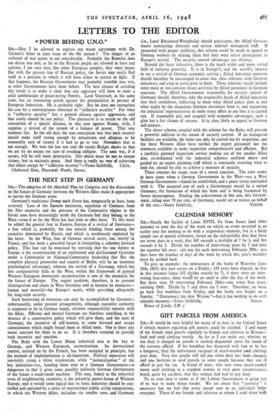CALENDAR MEMORY
SIR,—Surely the facility of Louis XVIII, Sir Isaac Isaacs (and other persons) to state the day of the week on which an event occurred in an earlier year has nothing to do with a stupendous memory, but is a fairly simple use of mental arithmetic, based on the indisputable data that there are seven days in a week, that 365 exceeds a multiple of 7 by 1, and 366 exceeds it by 2. Divide the number of intervening years by 7 and note the number left over: add one for each intervening February 29th: you then have the number of days of the week by which this year's weekday must be pushed back.
To give an example: the anniversary of the battle of Waterloo (June 18th, 1815) this year occurs on a Friday ; 133 years have elapsed, so that in this instance (since 133 divides exactly by 7), if there were no inter- vening leap-years, there would be no need to alter the day of the week. But there were 33 intervening February 29ths—one every four years, omitting 1900. Divide by 7 and there are 5 over. Therefore, we must go back five weekdays from Friday, and the battle was fought on a Sunday. "Elementary,.my dear Watson "—but it has nothing to do with






























 Previous page
Previous page